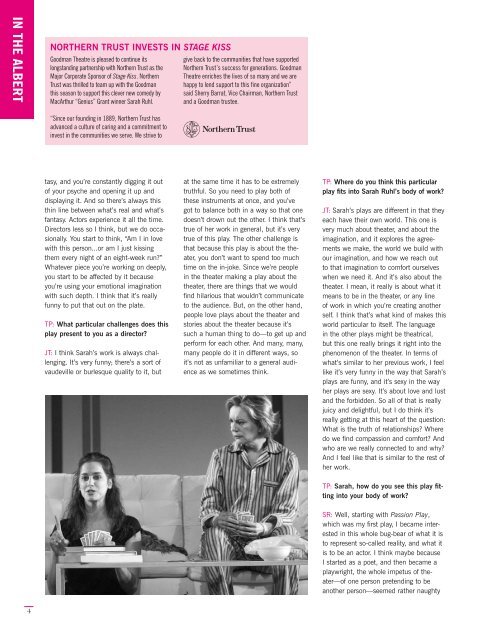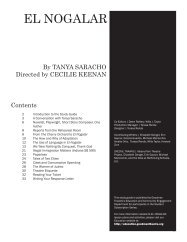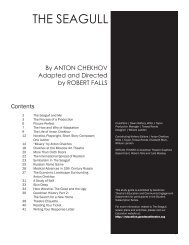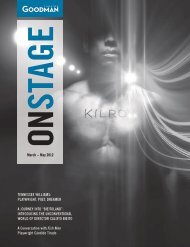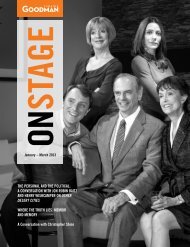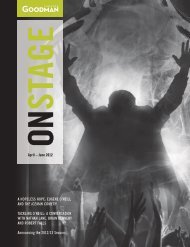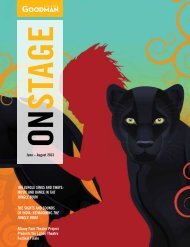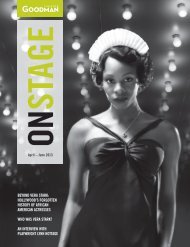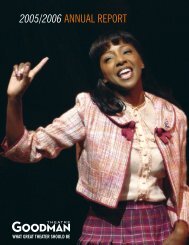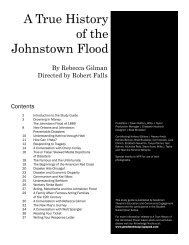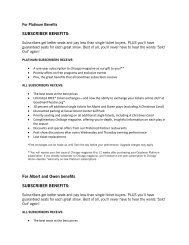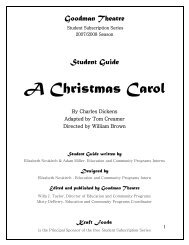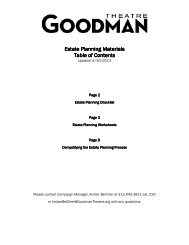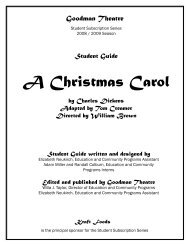Stage Kiss - Goodman Theatre
Stage Kiss - Goodman Theatre
Stage Kiss - Goodman Theatre
You also want an ePaper? Increase the reach of your titles
YUMPU automatically turns print PDFs into web optimized ePapers that Google loves.
IN THE ALBERT<br />
NORTHERN TRUST INVESTS IN STAGE KISS<br />
<strong>Goodman</strong> <strong>Theatre</strong> is pleased to continue its<br />
longstanding partnership with Northern Trust as the<br />
Major Corporate Sponsor of <strong>Stage</strong> <strong>Kiss</strong>. Northern<br />
Trust was thrilled to team up with the <strong>Goodman</strong><br />
this season to support this clever new comedy by<br />
MacArthur “Genius” Grant winner Sarah Ruhl.<br />
give back to the communities that have supported<br />
Northern Trust’s success for generations. <strong>Goodman</strong><br />
<strong>Theatre</strong> enriches the lives of so many and we are<br />
happy to lend support to this fine organization”<br />
said Sherry Barrat, Vice Chairman, Northern Trust<br />
and a <strong>Goodman</strong> trustee.<br />
“Since our founding in 1889, Northern Trust has<br />
advanced a culture of caring and a commitment to<br />
invest in the communities we serve. We strive to<br />
tasy, and you’re constantly digging it out<br />
of your psyche and opening it up and<br />
displaying it. And so there’s always this<br />
thin line between what’s real and what’s<br />
fantasy. Actors experience it all the time.<br />
Directors less so I think, but we do occasionally.<br />
You start to think, “Am I in love<br />
with this person...or am I just kissing<br />
them every night of an eight-week run?”<br />
Whatever piece you’re working on deeply,<br />
you start to be affected by it because<br />
you’re using your emotional imagination<br />
with such depth. I think that it’s really<br />
funny to put that out on the plate.<br />
TP: What particular challenges does this<br />
play present to you as a director?<br />
JT: I think Sarah’s work is always challenging.<br />
It’s very funny; there’s a sort of<br />
vaudeville or burlesque quality to it, but<br />
at the same time it has to be extremely<br />
truthful. So you need to play both of<br />
these instruments at once, and you’ve<br />
got to balance both in a way so that one<br />
doesn’t drown out the other. I think that’s<br />
true of her work in general, but it’s very<br />
true of this play. The other challenge is<br />
that because this play is about the theater,<br />
you don’t want to spend too much<br />
time on the in-joke. Since we’re people<br />
in the theater making a play about the<br />
theater, there are things that we would<br />
find hilarious that wouldn’t communicate<br />
to the audience. But, on the other hand,<br />
people love plays about the theater and<br />
stories about the theater because it’s<br />
such a human thing to do—to get up and<br />
perform for each other. And many, many,<br />
many people do it in different ways, so<br />
it’s not as unfamiliar to a general audience<br />
as we sometimes think.<br />
TP: Where do you think this particular<br />
play fits into Sarah Ruhl’s body of work?<br />
JT: Sarah’s plays are different in that they<br />
each have their own world. This one is<br />
very much about theater, and about the<br />
imagination, and it explores the agreements<br />
we make, the world we build with<br />
our imagination, and how we reach out<br />
to that imagination to comfort ourselves<br />
when we need it. And it’s also about the<br />
theater. I mean, it really is about what it<br />
means to be in the theater, or any line<br />
of work in which you’re creating another<br />
self. I think that’s what kind of makes this<br />
world particular to itself. The language<br />
in the other plays might be theatrical,<br />
but this one really brings it right into the<br />
phenomenon of the theater. In terms of<br />
what’s similar to her previous work, I feel<br />
like it’s very funny in the way that Sarah’s<br />
plays are funny, and it’s sexy in the way<br />
her plays are sexy. It’s about love and lust<br />
and the forbidden. So all of that is really<br />
juicy and delightful, but I do think it’s<br />
really getting at this heart of the question:<br />
What is the truth of relationships? Where<br />
do we find compassion and comfort? And<br />
who are we really connected to and why?<br />
And I feel like that is similar to the rest of<br />
her work.<br />
TP: Sarah, how do you see this play fitting<br />
into your body of work?<br />
SR: Well, starting with Passion Play,<br />
which was my first play, I became interested<br />
in this whole bug-bear of what it is<br />
to represent so-called reality, and what it<br />
is to be an actor. I think maybe because<br />
I started as a poet, and then became a<br />
playwright, the whole impetus of theater—of<br />
one person pretending to be<br />
another person—seemed rather naughty<br />
4


